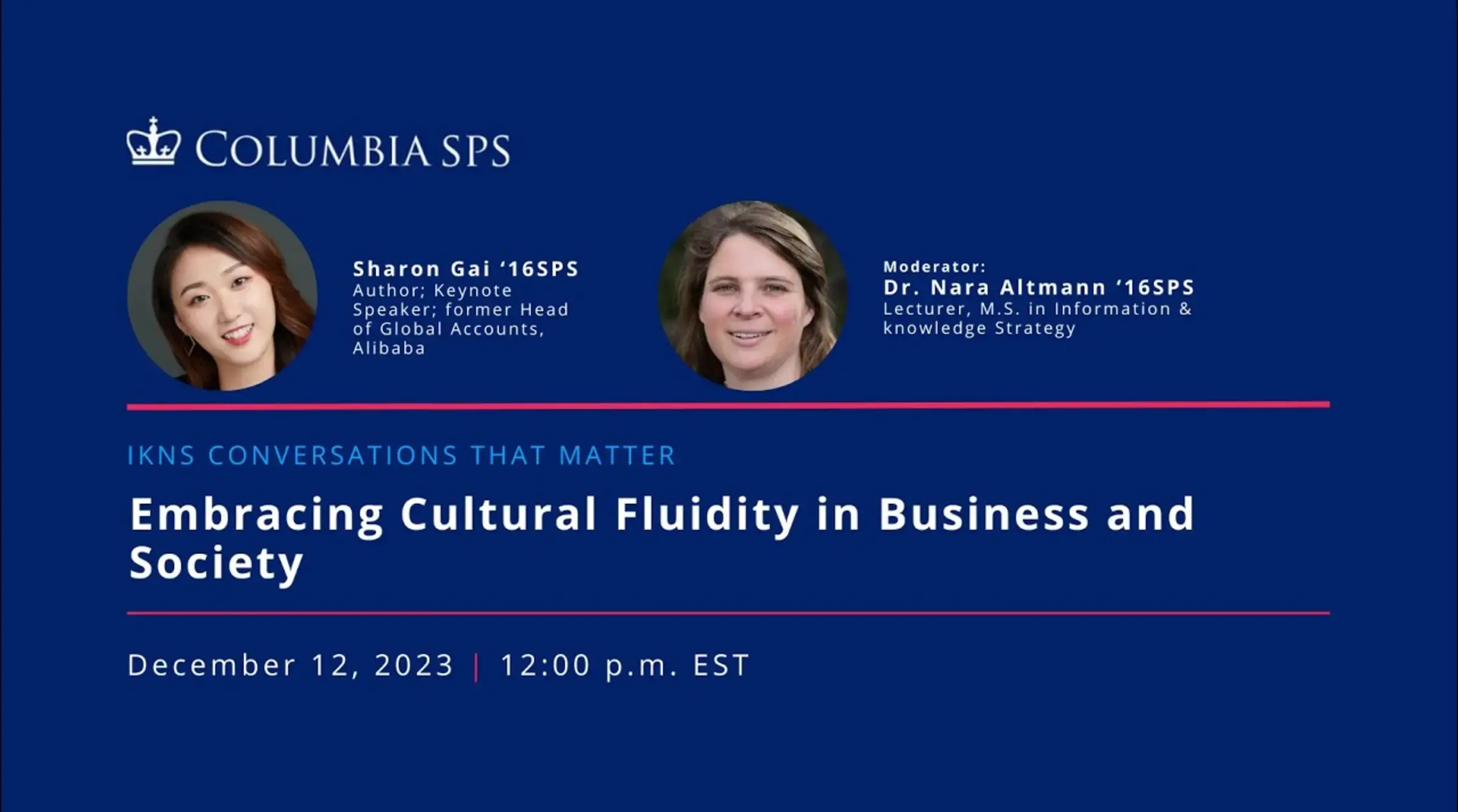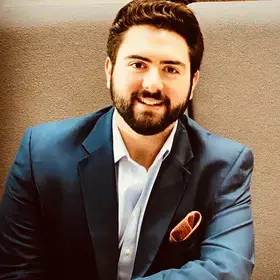In the latest “IKNS: Conversations That Matter” event, Dr. Nara Altmann spoke with alum and cultural fluidity keynote speaker Sharon Gai.
Ethnocentrism, assessing other cultures in the narrow framework of one’s own, is a concept that goes back at least as far as Heroditus. But whether or not ethnocentrism had a place in ancient Greece, its inherent attitudes are frowned upon in today’s society—and can be a liability in the world of business.
That was the message that Information & Knowledge Strategy (IKNS) alum Sharon Gai (’16SPS, IKNS), an author and former head of global accounts for Alibaba, brought to the program’s Conversations That Matter series. IKNS lecturer Dr. Nara Altmann joined Gai in a discussion about “cultural fluidity,” a novel set of skills of building bridges across our increasingly polarized society, and how diversity can add value to organizations—from better problem solving to improved customer service.
As someone who was born in China, grew up in Canada, moved to the U.S., and then returned to work in China, Gai has a unique perspective on cultural literacy in the business world. “I had a stark realization of not feeling like I particularly belonged there because of my upbringing in the West, and then suddenly diving into the East,” she shared during the conversation with Altman.
Working in China made Gai realize the value placed on diversity in the business world there, and how broad the concept of diversity truly is. More than in many places, she said, Chinese businesses believe that the best solutions come from groups of co-workers of different genders, ages, and backgrounds working together. A commitment to that spirit of collaboration, along with a strong work ethic and flexibility in rapidly changing markets, have led to the success that Chinese firms have seen in tech development.
Gai stressed a very localized notion of “culture,” saying that such things as food, clothing, and vernacular make up a person’s cultural identity. She noted that the cultures of customers can be different from the culture of employees, and that supervisors must be aware and train employees for the customers with whom they’ll interact. “Culture extends far beyond just an ethnic culture,” Gai said. “It extends into the way that we grew up, the city that we come from, even when it’s within one’s country.”
She also discussed how social media can exacerbate isolating tendencies, noting that algorithms reward our interests.
“This is what I see as the echo chamber effect,” she said. “We are scrolling ourselves into an echo chamber where we’re constantly double-tapping or sharing videos or content that we already agree with. The younger generation is especially less resilient mentally to opposing thoughts and opposing ideas. This is why we have the amount of polarization in the world today.”
In response to a question from a member of the online audience, Gai said the main thing businesses should do is be open.
“There’s already a fear of what we’re allowed to say and what we’re not allowed to say, and I think it’s a phenomenon that’s happening in the U.S. right now where a lot of people feel like they’re walking on eggshells,” she said. “It’s such a brittle atmosphere that we’re in. … People want to put up their hands and ask something out of curiosity, but they have this fear of ‘I don’t want to offend certain people or a group of people’ or ‘How do I dance around this?’ I don’t think that’s healthy, and I think that’s what’s also causing a lot of the polarization that we have today. There are groups of people who feel like they can’t say what they want to say or that they can’t talk openly in a psychologically safe space about their opinions.”
Another lesson she’s learned along the way, Gai said, is a notion known as Hanlon’s Razor, which speaks to tolerance in the workplace: Never attribute to malice that which can be adequately explained as ignorance.
Today, Gai puts her IKNS training and own professional experience to work by giving keynote speeches and facilitating training in cultural literacy. As elements towards a solution, Gai recommends organizations hold honest spaces for dialogue where people are receptive to uncertainty and change, give grace to one another and are not so quick to judge or feel offended—and notes that cultural fluidity is like a muscle one builds and employs in these spaces that helps the group move away from ethnocentrism and polarization.
Recalling her time at Columbia in the IKNS program, Gai notes: “A lot of the things that I pulled from what I learned during my time at Columbia, such as the skill to facilitate discussions and healthy conversations between disagreeing parties, are becoming more and more useful in what I talk about today.”
About the Program
The Columbia University M.S. in Information & Knowledge Strategy (IKNS) program provides students with foundations in information science, organizational psychology, and change management as well as practical skills in project management and executive leadership.
Fall 2024 application deadlines for the M.S. in Information & Knowledge Strategy program are March 15 for applicants with international documents and June 1 for the final deadline. Applications are reviewed and admission decisions released on a rolling basis. Learn more here.
Watch the full event below:



